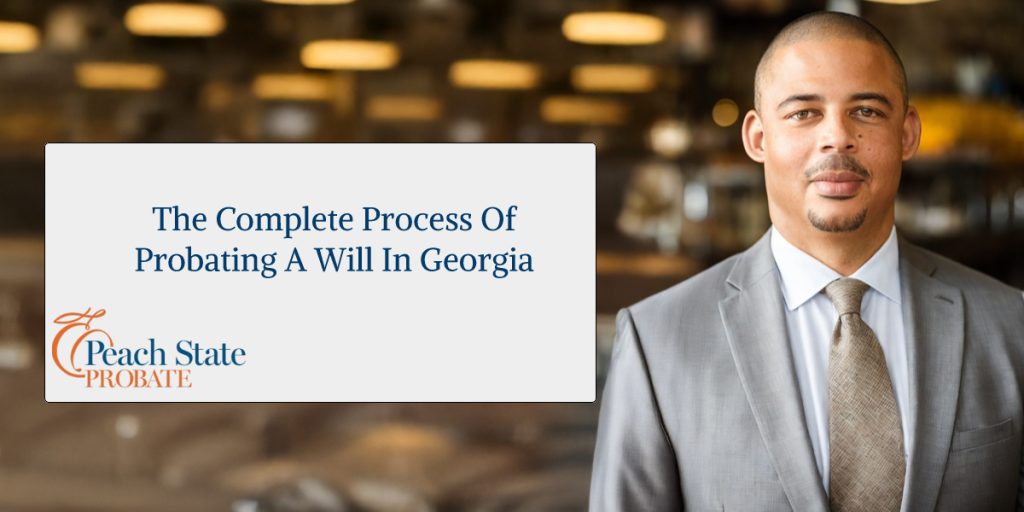## Understanding the Process of Probating a Will in Georgia
Probating a will is a legal process that involves the validation of a deceased person’s will, ensuring that their final wishes are honored as per state law. In Georgia, this process can be complex, requiring an in-depth understanding of local regulations and legal procedures. The probate process typically begins after the death of the estate owner, when an individual, often selected by the deceased, steps forward to carry out the terms of the will. The executor’s responsibilities encompass a range of tasks, including locating the deceased’s assets, settling debts, and distributing property among heirs or beneficiaries.
The probate process not only validates the will but also provides a formal avenue for collecting and managing the estate’s assets. This legal framework exists to protect the interests of the deceased’s beneficiaries while ensuring that all claims against the estate are resolved as stipulated by law. Georgia’s probate laws offer guidelines for how estates are to be managed, including the timelines and procedures that must be adhered to throughout the process.
When navigating the process of probating a will in Georgia, it is crucial to recognize the importance of understanding local laws, as these can impact everything from tax liabilities to timelines for asset distribution. Proper knowledge ensures compliance and helps avoid potential disputes among heirs, making the entire process more efficient and respectful of the deceased’s wishes.
## What Is Involved in Probating a Will?
Probating a will encompasses several critical components designed to validate the document and oversee the distribution of the decedent’s assets. It is initiated when the executor files the will with the probate court in the county where the deceased resided, ensuring that the will adheres to state laws. This step includes obtaining a certified copy of the death certificate, which serves as essential proof during the probate proceedings.
Once the will is filed, the court schedules a hearing, often referred to as the “probate hearing.” Here, the validity of the will may be challenged by interested parties. If no disputes arise, the court officially admits the will to probate, empowering the executor to act on the estate’s behalf. The executor then performs various duties, such as informing beneficiaries and creditors, collecting assets, and addressing any debts or taxes owed by the estate.
Importantly, probating a will also involves ongoing oversight from the probate court throughout the process. The court may require periodic updates from the executor, ensuring that the estate administration is transparent and completed in accordance with legal standards. Understanding each component of this process is fundamental for the executor if they aim to fulfill their responsibilities diligently and without complications.
## Importance of Probating a Will
Probating a will is of paramount importance for several reasons, the foremost being the legal recognition of the deceased’s wishes. By formally validating a will through the probate process, the court ensures that the deceased’s intentions regarding asset distribution and beneficiary designations are honored. This legality not only protects the rights of beneficiaries but also provides clarity and closure for family members navigating their grief.
Another key aspect of probating a will is its role in settling the estate’s debts and taxes. During the process, creditors are granted the opportunity to submit claims against the estate, thereby allowing the executor to pay any outstanding debts before distributing assets to beneficiaries. This ensures that the estate is financially settled and that beneficiaries receive their inheritances free of the burden of unpaid debts.
Additionally, probating a will helps to prevent family disputes and conflicts that can arise when multiple parties have differing interpretations of the deceased’s intentions. By providing a transparent legal framework, the probate process promotes cooperation among heirs and beneficiaries, fostering a smoother transition of property and assets. The significance of this legal process cannot be overstated, as it is designed to facilitate the responsible and respectful management of a deceased person’s estate.
## The Legal Framework Governing Probating a Will in Georgia
The legal framework surrounding the probate process in Georgia is defined primarily by the Georgia Probate Code. This comprehensive set of statutes outlines the procedures for probating a will, appointing executors, and administering estates. Understanding the intricacies of this code is essential for anyone involved in the probate process, whether as an executor, beneficiary, or interested party.
In Georgia, the probate process is generally initiated in the county where the decedent resided at the time of their death. The probate court holds jurisdiction over all aspects of the estate, including the validation of the will and oversight of the executor’s administration. The code delineates specific requirements for filing, assesses timelines within which various actions must be taken, and establishes the necessary documentation to support legal proceedings.
Another critical aspect of the legal framework is the distinction between different types of probate: testate, where a valid will exists, and intestate, where no will is present. Each scenario carries unique legal implications and processes. In testate probate, the court must validate the will and include it in the probate proceedings. In intestate cases, Georgia law determines how the estate is distributed, often leading to a different set of challenges for those involved. Knowledge of these frameworks is paramount for anyone looking to navigate the complex probate landscape in Georgia.
## Real-World Situations Involving the Probating of a Will
Real-world examples of probating a will can shed light on the nuances and challenges that often arise in this legal process. For instance, consider a scenario where an individual passes away leaving behind a complex estate, including real estate, investments, and personal belongings. The executor must navigate the task of valuing the estate, negotiating with creditors, and ensuring that all debts are paid in order to prepare for a proper distribution to the beneficiaries.
In another situation, disputes may arise among family members regarding the interpretation of the will. For example, if one sibling believes they were intended to receive a specific family heirloom, while another sibling contests this interpretation, the probate court may need to intervene to resolve the disagreement. Such conflicts can prolong the probate process, leading to added emotional strain and financial burdens for the parties involved.
Additionally, some estates may encounter tax issues during probate. The executor is responsible for ensuring that any estate taxes due are paid before the distribution of assets. A lack of understanding regarding tax implications can lead to costly mistakes, potentially diminishing the value of the estate and affecting beneficiaries’ inheritances. Such real-world scenarios underscore the need for thorough preparation and a firm grasp of the probate process to navigate challenges effectively.
## Steps to Take When Probating a Will
When probating a will, following a structured set of steps can facilitate a smoother process and ensure compliance with Georgia’s legal requirements. The first step involves locating the original will and determining the decedent’s death. Typically, the executor named in the will should file the document with the appropriate probate court. It’s critical to gather all necessary documents, including a certified copy of the death certificate and other paperwork that demonstrates the decedent’s assets and liabilities.
Once the will is submitted for probate, the court will either accept or contest its validity. If accepted, the executor receives “Letters Testamentary,” granting them the legal authority to act on behalf of the estate. This includes notifying beneficiaries and creditors, gathering and inventorying the estate’s assets, and settling any outstanding debts. It is vital for the executor to keep careful records of all transactions related to the estate.
Throughout this process, communication is key. The executor should maintain transparency with beneficiaries to keep them informed of any developments, timelines, and expectations. Promptly attending to the responsibilities assigned by the court can minimize complications, reduce tension among heirs, and help ensure that the estate is settled according to the deceased’s wishes.
## Common Mistakes in the Probate Process
Navigating the probate process can be fraught with challenges, and common mistakes can severely complicate the experience for executors and beneficiaries alike. One frequent misstep involves the failure to fully understand the terms of the will. Executors may make assumptions or overlook subtleties that can lead to unintended distributions or conflicts among heirs. It’s essential to analyze the will carefully and seek clarification on any points that seem ambiguous or complicated.
Another notable error is neglecting to inform all necessary parties of the probate proceedings. Failing to notify beneficiaries or known creditors can lead to legal repercussions and prolong the process significantly. Georgia law requires that proper notice is given; hence, executors must ensure that all relevant parties are informed and that all claims against the estate are addressed within designated timelines.
Lastly, some executors underestimate the importance of maintaining thorough records of all financial transactions and decisions made during the probate process. Lack of documentation can result in misunderstandings or even accusations of mismanagement, which may expose the executor to legal liability. Proper accounting practices not only build trust among beneficiaries but also ensure compliance with legal requirements, thereby facilitating a smoother administration of the estate.
## Determining When to Consult an Attorney for Probate Matters
Recognizing when to consult an attorney during the probate process can significantly impact the efficiency and effectiveness of estate administration. Although some individuals may attempt to navigate the probate process independently, the complexities involved often warrant legal assistance to avoid mistakes that could have lasting legal and financial consequences. Common indicators that legal guidance is necessary include the presence of a contested will, complex estate situations, or if the estate involves unique assets like businesses or real estate.
Additionally, navigating the intricacies of estate taxes can be daunting. The laws surrounding probate-related taxes are stringent, and the executor must ensure compliance to prevent costly penalties or delays in transferring assets. If uncertainties arise regarding tax obligations or potential liabilities on the estate, consulting an attorney specializing in probate law can provide the needed clarity.
It’s also wise to seek legal advice when major disputes arise among beneficiaries or if there is concern regarding potential litigation. Engaging a qualified attorney early in the process can aid in conflict resolution and help strategize on the necessary steps to address any emerging issues, ensuring the executor fulfills their obligations while protecting the interests of all parties involved.
## Advantages of Legal Representation During Probate
Obtaining legal representation during the probate process comes with numerous advantages that can contribute to a more seamless experience for executors and beneficiaries alike. One of the most significant benefits is the assurance of compliance with Georgia’s probate laws, avoiding potential pitfalls that may arise from misunderstandings or misinterpretations of legal requirements. An attorney can help navigate the often complex legal landscape, ensuring that all procedural requirements are met in a timely manner.
Legal representation also brings a wealth of knowledge regarding the intricacies of estate planning, including asset valuation, estate taxes, and creditor claims. An experienced attorney can offer insights into tax strategies that may benefit the estate, helping to maximize asset value and limit financial repercussions. This guidance can be invaluable in managing the estate efficiently and can lead to a more favorable outcome for the beneficiaries.
Furthermore, an attorney can provide necessary support in conflict resolution. When disputes arise among heirs or with creditors, having legal representation can facilitate negotiations and help develop strategies to address concerns. An attorney can also represent the executor’s interests in court, minimizing the emotional burden and stress associated with the probate process. Overall, strong legal representation promotes a structured and effective approach to managing the complexities of probating a will.
## How Peach State Probate Enhances Your Probate Experience
Peach State Probate specializes in guiding clients through the intricacies of probating a will in Georgia, ensuring that each aspect of the process is handled with professionalism and compassion. Our experience in Georgia probate law equips us with the knowledge necessary to navigate both routine and complex probate matters effectively. We understand that the loss of a loved one is often accompanied by financial challenges and emotional turmoil. Our goal is to simplify the process, alleviating the stress associated with probate so families can focus on healing.
We take pride in our client-centered approach, which prioritizes open communication and transparency throughout the entire probate process. At Peach State Probate, we understand that every estate is unique, and we work diligently to create customized strategies tailored to the specific needs of each client. Our dedicated team will keep clients informed at every stage of probate, addressing questions and concerns promptly to ensure a smoother experience.
Additionally, our firm embodies the importance of preventing conflicts among beneficiaries. We employ mediation techniques and conflict resolution strategies aimed at fostering cooperation and understanding among family members during a trying time. By offering compassionate and informed guidance, Peach State Probate plays an essential role in ensuring that the probating of a will is conducted in a fair and respectful manner.




